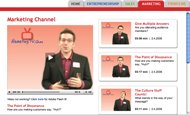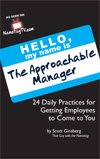 You can only darken people’s doorsteps so many times.
You can only darken people’s doorsteps so many times.
Eventually, the goal is to position yourself so THEY pursue YOU.
THEY meaning prospects ready to buy from you.
THEY meaning followers prepared to be inspired by you.
THEY meaning the media excited about interviewing you.
THEY meaning key players interesting in partnering with you.
THEY meaning customers stoked about doing business with you.
Because – as much as you’d like to – you can’t MAKE people pursue you.
You can, however, transform yourself into a more pursuable person.
Here’s a list of strategies for doing so: (Read part one of this series!)
1. Acknowledge your own value. If you don’t value you – they won’t value you. Period. The first sale is selling yourself to yourself. Fortunately, all it takes belief, discipline, commitment and confidence. People pursue people like that. What’s your system for strengthening your self-belief?
2. Aggressively invest in building remarkable moments. Ideally, moments that MOVE customers from “satisfied” to “loyal” to, eventually, “insistent.” The secret for doing so can be summarized in seven words: Create an opportunity for a service event. Whether it’s in-person, on the phone or online, the key word is “event.”
That’s what approachability is all about: An interaction that otherwise wouldn’t have existed … that’s memorable for the right reasons. The cool part is, the more of these remarkable events you create, the more pursued you become. It’s a simple probability equation.
And if you do it right, over time, other companies will want to steal your service philosophy. Because remarkability generates gasps. Gasps get repeated. And repeated gasps garner repeat business. What do you do SO well that people come back to see you do it again?
3. Be a better self-advertisement. The articulation of your fabulousness. The living brochure of your awesomeness. The walking translation of your value. THAT’S what advertising should be. Interestingly, the word “advertise” derives from the Latin advertere, which means, “to turn toward.” Interesting.
That means: No eye-gauging billboards. No tree-killing table tents. And no blood-boiling commercials. Just helping people to turn toward you. Arresting their attention, grabbing the world by the lapel and whispering aggressively into its ear, “Psst! Yeah, you. Check THIS out…”
Not in an interruptive way, of course. Just enough passion to be noticeable and listenable, but without being questionable and checkoffable. People pursue people like that. Are you a public pitchman for the product of YOU?
4. Pursuit is a function of growth. The more you grow, the bigger you become; and the bigger you become, the broader your pursuit range. So, by virtue of growth, you’re mathematically appealing to a more diverse population of prospects.
That in mind, here’s my personal philosophy on the subject: Refuse to let any day pass without personal growth. Doesn’t matter how infinitesimal it is – there’s no such thing as insignificant growth. And it’s not about competing with anyone.
It’s about evolving beyond the previous version of yourself into something more beautiful, more valuable and yes, more pursuable. How will you create the best possible circumstance in which your growth will be supported, enhanced and fulfilled?
5. Make follow-up easy. The word “pursue” comes from the Latin prosequi, which means, “to follow up.” VERY interesting. That’s why it’s crucial to remember that being pursued is useless if you’re not returning the favor. You need to get back with people quickly.
Because while the “Good, Fast and Cheap” mindset used to be enough, NOW you’re dealing with a customer expectation of “Perfect, Now and Free.” Are you returning calls faster than your competitors?
Remember: As much as you’d like to – you can’t MAKE people pursue you. You can, however, transform yourself into a more pursuable person.
LET ME ASK YA THIS…
Whatcha gonna do when they come for you?
LET ME SUGGEST THIS…
For the list called, “12 Ways to Out Service the Competition,” send an email to me, and you win the list for free!
* * * *
Scott Ginsberg
That Guy with the Nametag
Author, Speaker, Coach, Entrepreneur
[email protected]
 Never the same speech twice.
Never the same speech twice.
Always about approachability.
Watch The Nametag Guy in action here!

 Who’s in hot pursuit of you?
Who’s in hot pursuit of you? 1. Attention without conversion is narcissism. Attention for the sake of attention feeds your ego. Attention for the sake of conversion – that is, building a following through your permission asset so your movement (not product) can make people’s lives better – feeds your wallet. The choice is yours.
1. Attention without conversion is narcissism. Attention for the sake of attention feeds your ego. Attention for the sake of conversion – that is, building a following through your permission asset so your movement (not product) can make people’s lives better – feeds your wallet. The choice is yours. 
 1. Attitude is the best asset. Especially in a down economy. My challenge to you is to approach recessions as opportunities to renew resourcefulness. By blaming the economy you evade responsibility and continue to NOT taking action. Instead, believe that greatness is near.
1. Attitude is the best asset. Especially in a down economy. My challenge to you is to approach recessions as opportunities to renew resourcefulness. By blaming the economy you evade responsibility and continue to NOT taking action. Instead, believe that greatness is near.
 1. Insecurity is the great inhibitor. Insecurities are growth opportunities. “I don’t care how self-aware you get – there’s always more to learn,” says my coach
1. Insecurity is the great inhibitor. Insecurities are growth opportunities. “I don’t care how self-aware you get – there’s always more to learn,” says my coach  There are no cover bands in the Rock and Roll Hall of Fame.
There are no cover bands in the Rock and Roll Hall of Fame.  Woody Allen was wrong.
Woody Allen was wrong. “Why aren’t my people asking me for help?”
“Why aren’t my people asking me for help?” Five words that will change your business forever:
Five words that will change your business forever:
 I know this guy named Dalton.
I know this guy named Dalton.